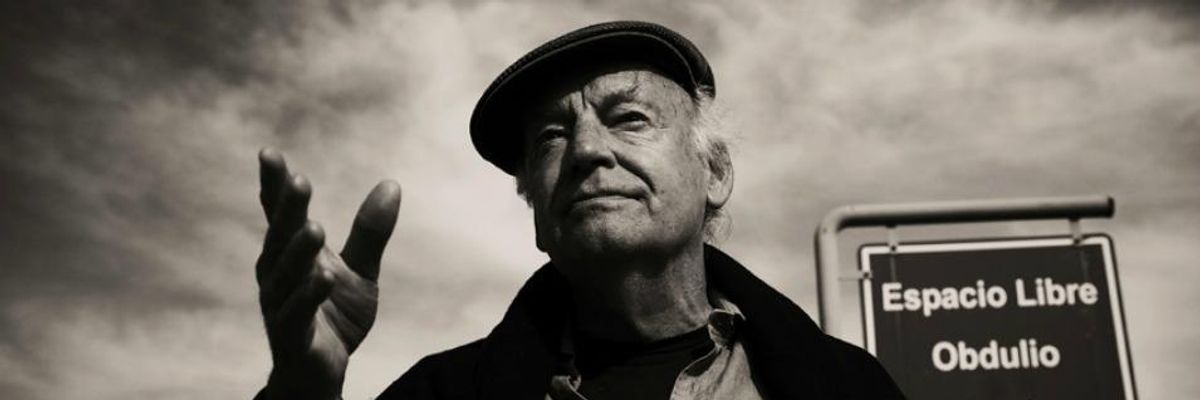Award-winning Uruguayan writer and thinker Eduardo Galeano, considered a leading voice of Latin America's left, has died at 74.
The world-renowned author, who had been diagnosed with lung cancer, died in Montevideo on Monday.
The novelist and journalist--whose work transcended genre and who once said "all written work constitutes literature, even graffiti"--was the prolific author of books including Memory of Fire, a three-volume narrative of the history of North and South America; The Book of Embraces, described by Library Journal as a "literary scrapbook, mixing memoir, documentary, essay, and prose poem"; and The Open Veins of Latin America: Five Centuries of the Pillage of a Continent, which analyses five centuries of economic and political exploitation in the region, perpetrated first by Europe and later by the United States.
The last book brought Galeano into the spotlight 36 years after its original publication, when in 2009 the late Hugo Chavez, then president of Venezuela, gave President Barack Obama a paperback copy.
Galeano, a regular contributor to The Progressive and the New Internationalist, was a powerful critic of both capitalism and imperialism in every form.
"This world is not democratic at all," Galeano told the Guardian in 2013. "The most powerful institutions, the IMF [International Monetary Fund] and the World Bank belong to three or four countries. The others are watching. The world is organized by the war economy and the war culture."
According toReuters:
Galeano started out as a journalist in the 1960s, writing 'Open Veins' at a time when he said his cattle-producing country "produced more violence than meat or wool."
Following a coup in 1973 and the banning of the book, he fled to neighboring Argentina. When that country's military dictatorship began its 'dirty war' against leftists in 1976, he went into exile again, this time in Spain.
He returned to Montevideo in 1985.
Galeano's most recent book, published in 2012, was Children of the Days: A Calendar of Human History. Reviewer Ian Sansom wrote that Children of the Days was "the ne plus ultra of the Galeano style and form, a triumph of his mosaic art--365 sad and strange and shiny little fragments, placed adjacent to one another to form a vast and seemingly coherent whole. All of Galeano's usual obsessions are vividly represented here: U.S. imperialism, the pharmaceutical industry, western governments, the military, the church, advertising, business, Hollywood."
Describing that book, as well as Galeano's overall career, Greg Grandin wrote in the New York Times: "Think of Pablo Neruda crossed with Howard Zinn."
In the wake of Galeano's passing, progressive writer and editor Tom Engelhardt, who served as American editor for the Memory of Fire trilogy (Pantheon Books) and Upside Down (Metropolitan Books), mused on the author's legacy:
Eduardo Galeano ended his history of everything, Mirrors, with these lines, "In my childhood, I was convinced that everything that went astray on earth ended up on the moon. But the astronauts found no sign of dangerous dreams or broken promises or hopes betrayed. If not on the moon, where might they be? Perhaps they were never misplaced. Perhaps they are in hiding here on earth. Waiting."
I hope that, like the betrayed dreams he spent his lifetime recording and the voices of the oppressed and the bold that he retrieved so movingly from the discard pile of mainstream history to inspire the rest of us, Galeano, who just died, is still in hiding somewhere on earth, or even on the moon, waiting.
In this 2009 GritTV interview with Laura Flanders, Galeano reads from and discusses The Open Veins of Latin America:
Others commemorated Galeano's death on Twitter:
